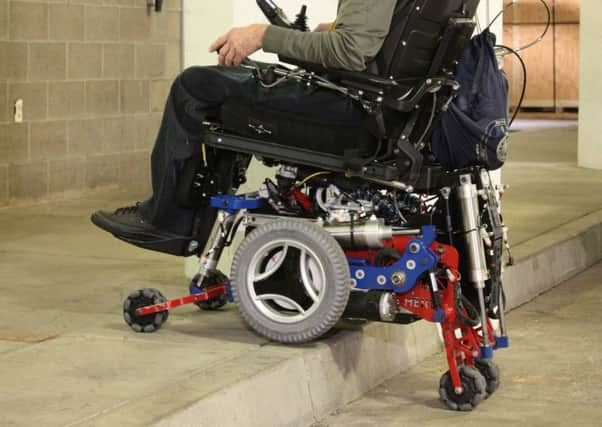Wheelchair that can climb stairs wins Scots design award


The Blackwood Design Awards took place at the Dundee Contemporary Arts centre and saw nine shortlisted inventors pitch for the top spot.
MEBot, a robotic-powered wheelchair with six wheels, was named best new concept, while GlassOuse, which uses Bluetooth to connect disabled users to computers and televisions, won the best new product title.
Advertisement
Hide AdAdvertisement
Hide AdThe annual competition was organised by Blackwood, an Edinburgh-based charity which helps find housing for those with disabilities.
Judges were impressed with the MEBot, particularly its ability to use front and rear caster wheels to inch forward on surfaces that traditional power wheelchairs can get stuck on.
It has a seat stabilisation system which keeps the driver safely upright and also stair climbing ability – which is ultimately what set it apart from other wheelchair designs.
The MEBot team, based in Pittsburgh, Pennsylvania, will now receive a cash prize of £2000 from BDA sponsor Kingdom Gas, professional support on design development from one of Scotland’s leading product design companies, 4c Design, and backing from business law experts, Harper MacLeod, in addition to that of Blackwood.
“The MEBot was inspired by wounded, injured and ill veterans that would like to be able to do more than is possible with current wheeled mobility devices,” said Rory Cooper, leader of the MEBot design team.
“We wanted to provide safe and expanded mobility and a design that is functional both indoors and outdoors.
“Ultimately, we’d like to license the MEBot to a commercial partner and see it transform the mobility and function of people with severe disabilities, and we’re very grateful to now have Blackwood’s advice and guidance.”
Designer Mehmet Turker entered pioneering product GlassOuse all the way from China. It is worn comfortably on the head like a pair of glasses and is made specifically to help those who cannot use a traditional mouse due to an inability to fully use their hands.
Advertisement
Hide AdAdvertisement
Hide AdThe headpiece has been designed for everyone but, in particular, to help those who have suffered traumatic injuries such as brain bleeds and tumours, strokes, spinal damage and cerebral palsy, which have left them needing additional support for everyday tasks.
Mehmet said: “Everyone here has worked extremely hard to perfect GlassOuse. Though the headpiece can be used by anyone, we wanted to create something that would also make everyday tasks a lot easier for those who have suffered life changing injuries.
“We’re currently designing GlassOuse 2 and are very excited for what’s to come in the future – especially now we have backing from Blackwood.”